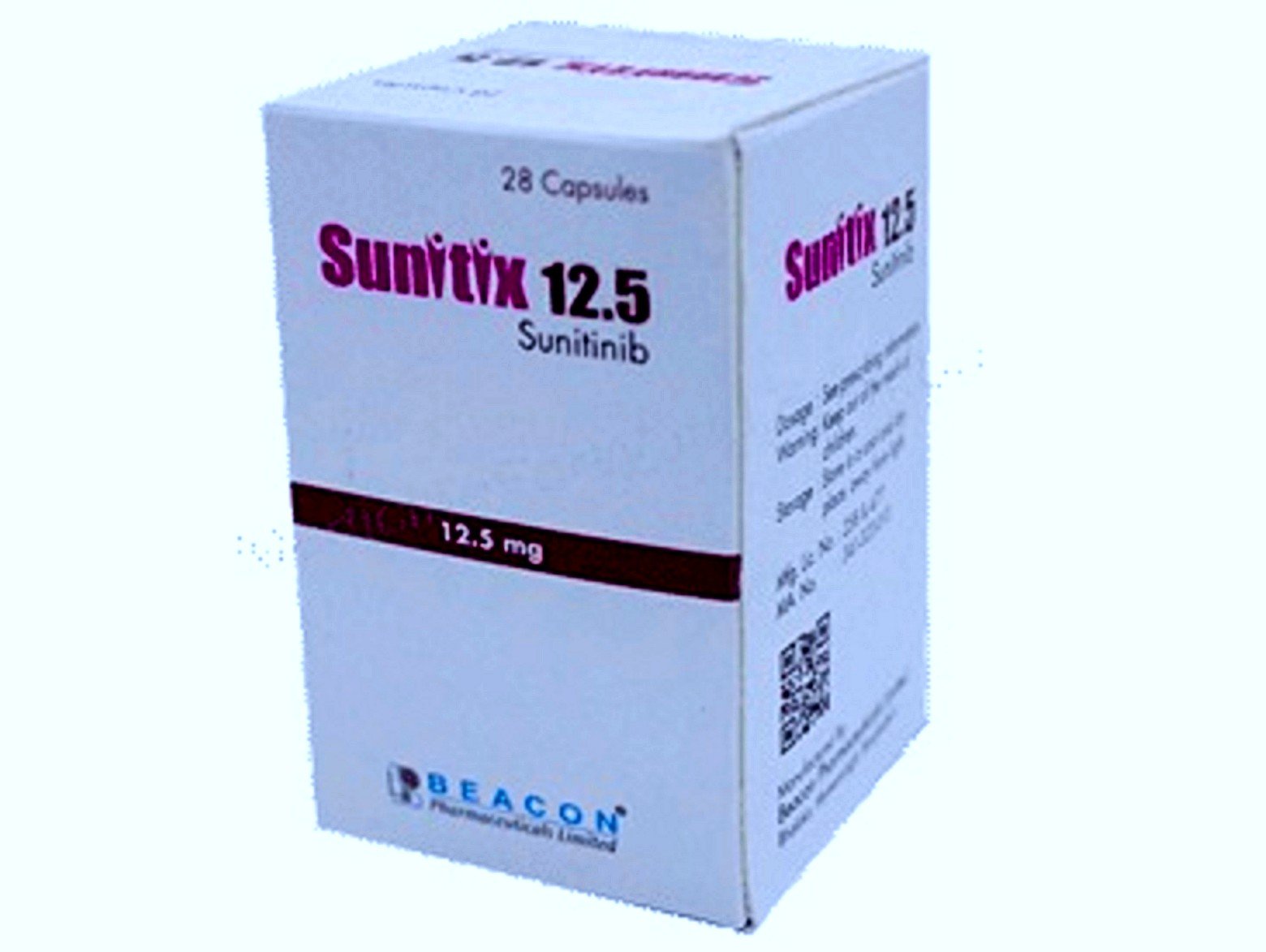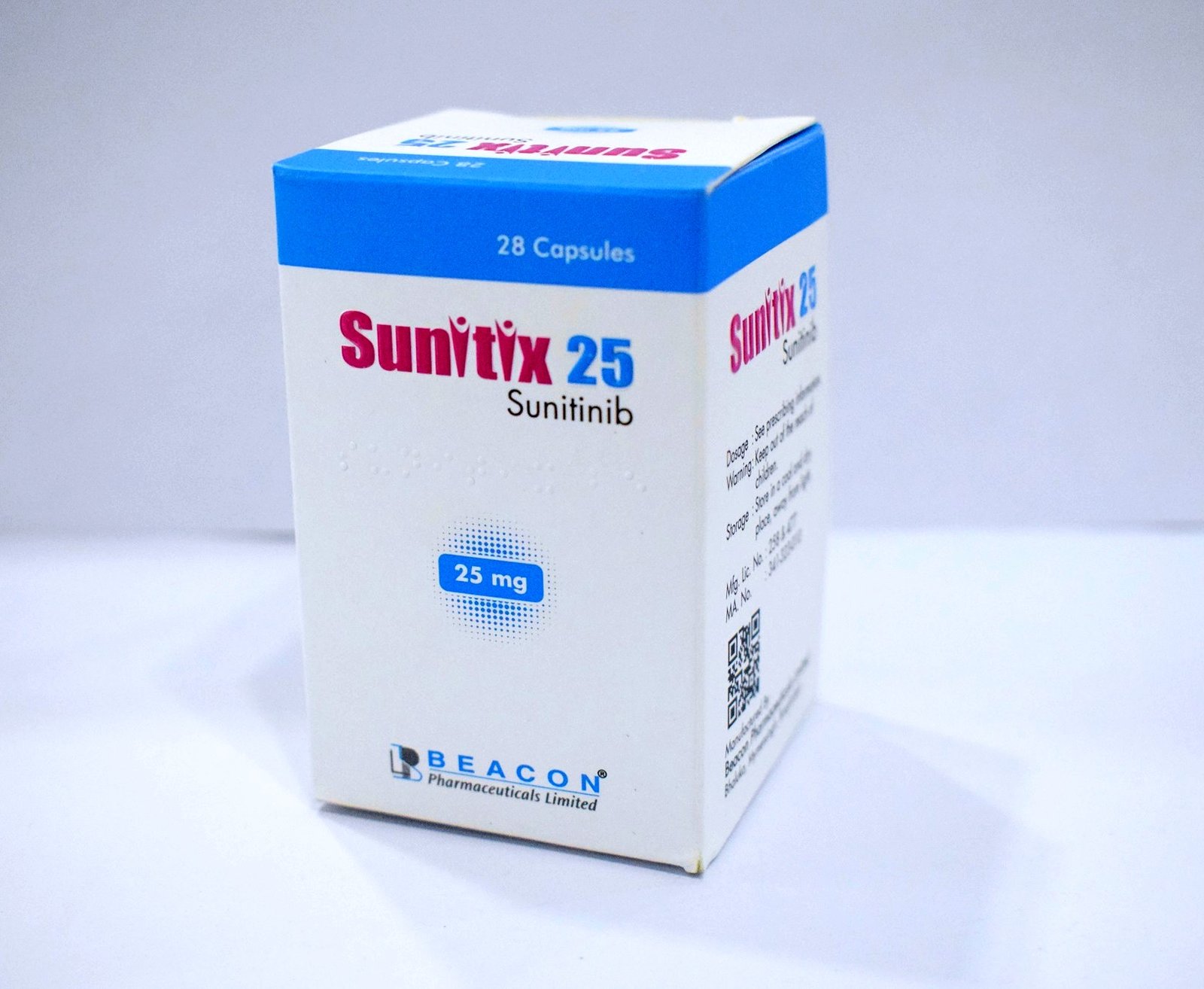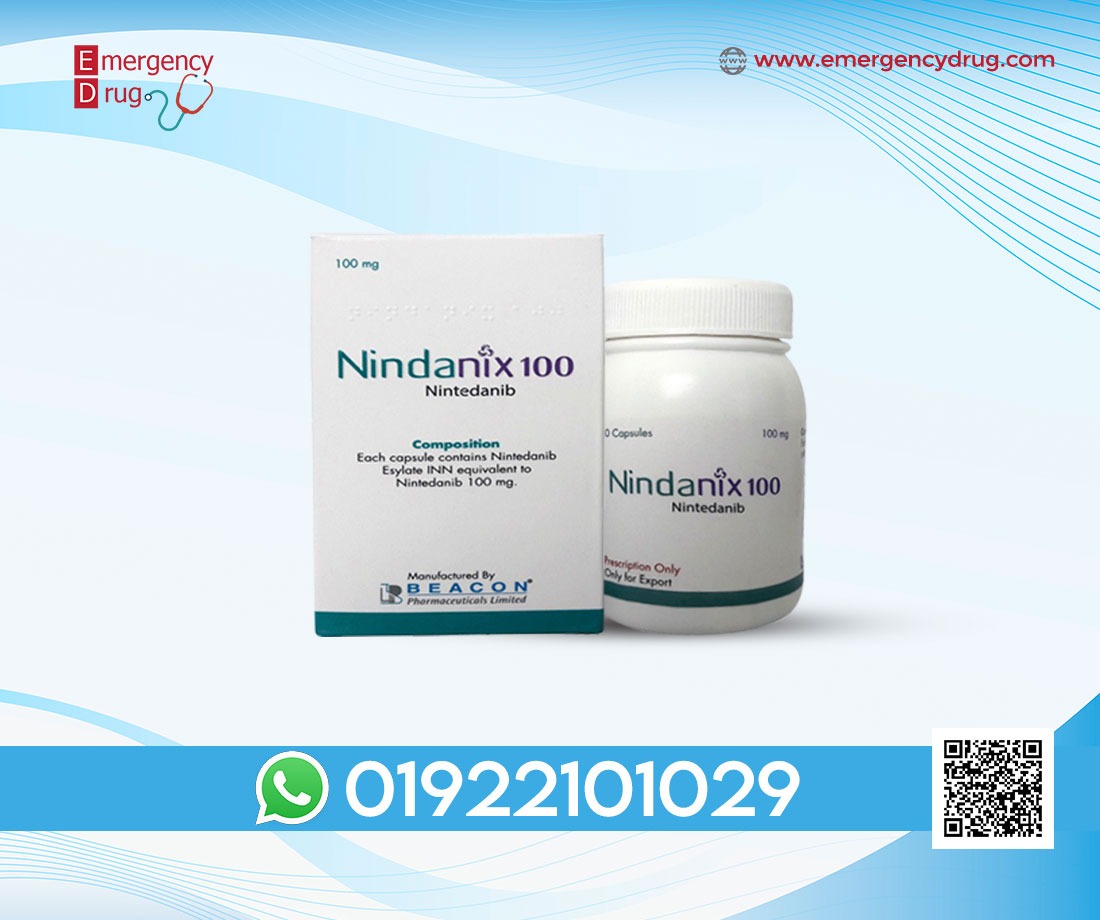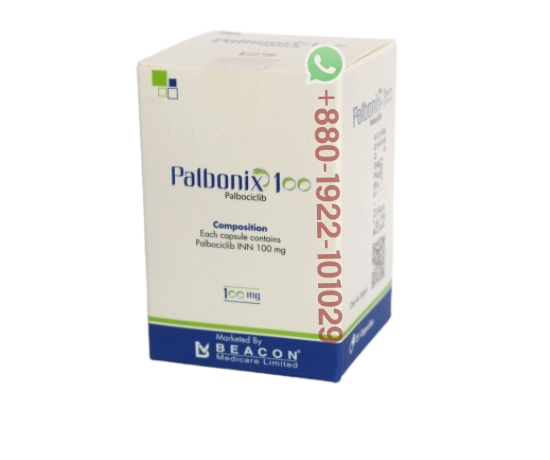
Sunitix (Sunitinib) 12.5 MG
Price: $110.00
Sunitix (Sunitinib) is an oral, small-molecule, multi-targeted receptor tyrosine kinase inhibitor that was approved by the FDA for the treatment of renal cell carcinoma and imatinib-resistant gastrointestinal stromal tumor.
Sunitix Capsule: Each capsule contains Sunitinib Malate INN equivalent to Sunitinib 50 mg.


Description
Sunitix (Sunitinib) works by blocking multiple molecular targets implicated in the growth, proliferation and spread of cancer. Two important Sunitinib targets, vascular endothelial growth factor receptor (VEGFR) and platelet-derived growth factor receptor (PDGFR) are expressed by many types of solid tumors and are thought to play a crucial role in angiogenesis. The process by which tumors acquire blood vessels, oxygen, and nutrients needed for growth. Sunitix also inhibits other targets important to tumor growth including KIT, FLT3 and RET.
Pharmacodynamics/Kinetics:
Maximum plasma concentrations (Cmax) of Sunitinib are generally observed between 6 and 12 hours (Tmax) following oral administration. Food has no effect on the bioavailability of Sunitinib. Sunitix may taken with or without food. Binding of Sunitinib and its primary active metabolite to human plasma protein in vitro was 95% and 90%, respectively, with no concentration dependence in the range of 100 – 4000 ng/ml. The apparent volume of distribution (Vd/F) for Sunitinib was 2230 L. In the dosing range of 25 – 100 mg, the area under the plasma concentration-time curve (AUC) and Cmax increase proportionately with the dose. Sunitinib metaboliz primarily by the cytochrome P450 enzyme, CYP3A4 to produce its primary active metabolite, which is further metabolized by CYP3A4. The primary active metabolite comprises 23 to 37% of the total exposure.
Special Uses in Populations
Population pharmacokinetic analyses of demographic data indicate that there are no clinically relevant effects of age, body weight, creatinine clearance, race, gender, or ECOG score on the pharmacokinetics of Sunitinib or the primary active metabolite.
Pediatric Use: The pharmacokinetics of Sunitinib have not been evaluated in pediatric patients.
Renal Insufficiency: Sunitix systemic exposure after a single dose of Sunitinib was similar in subjects with severe renal impairment (CLcr<30 mL/min) compared to subjects with normal renal function (CLcr>80 mL/min). Although Sunitinib not eliminated through hemodialysis, the Sunitinib systemic exposure was 47% lower in subjects with ESRD on hemodialysis compare to subjects with normal renal function.
Hepatic Insufficiency: Systemic exposures after a single dose of Sunitinib were similar in subjects with mild exocrine (Child-Pugh Class A) or moderate (Child-Pugh Class B) hepatic impairment compared to subjects with normal hepatic function.
Indications
Sunitix is a kinase inhibitor indicate for the treatment of:
A gastrointestinal stromal tumor (GIST) after disease progression on or intolerance to imatinib mesylate.
Advanced renal cell carcinoma (RCC).
Progressive, well-differentiated pancreatic neuroendocrine tumors (pNET) in patients with unrespectable locally advanced or metastatic disease.
Dosage and Administration
GIST and RCC: 50 mg orally once daily, with or without food, 4 weeks on treatment followed by 2 weeks off.
pNET: 37.5 mg orally once daily, with or without food, continuously without a scheduled off-treatment period.
Dose Modification: Dose interruptions and/or dose adjustments of 12.5 mg recommended based on individual safety and tolerability.
Over Dosage
Treatment of overdose with Sunitix should consist of general supportive measures. There is no specific antidote for over dosage with Sunitinib. If indicated, elimination of unabsorbed drug should achieve by emesis or gastric lavage. A few cases of accidental overdose have reported; these cases were associated with adverse reactions consistent with the known safety profile of Sunitinib or without adverse reactions. A case of intentional overdose involving the ingestion of 1,500 mg of Sunitinib in an attempted suicide report without adverse reaction. In non-clinical studies, mortality observe following as few as 5 daily doses of 500 mg/kg (3000 mg/m2 ) in rats. At this dose, signs of toxicity included impaired muscle coordination, head shakes, hypoactivity, ocular discharge, piloerection, and gastrointestinal distress. Mortality and similar signs of toxicity observe at lower doses when administer for longer durations.
Precautions
Hepatotoxicity, including liver failure has observed. Monitor liver function tests before initiation of treatment during each cycle of treatment, and as clinically indicated. Sunitix should interrupt for Grade 3 or 4 drug-related hepatic adverse events and discontinue if there is no resolution. Do not restart Sunitinib if patients subsequently experience severe changes in liver function tests or have other signs and symptoms of liver failure. Women of childbearing potential should advise of the potential hazard to the fetus and to avoid becoming pregnant. Cardiac toxicity including left ventricular ejection fraction declines to below the lower limit of normal and cardiac failure including death occur. Monitor patients for signs and symptoms of congestive heart failure.
Prolonged QT intervals and Torsade de Pointes observe. Use with caution in patients at higher risk for developing QT interval prolongation. When using Sunitinib, monitoring with on-treatment electrocardiograms and electrolytes should consider.
Adverse Effects
The most common adverse reactions (>_20%) are fatigue, asthenia, fever, diarrhea, nausea, mucositis/stomatitis, vomiting, dyspepsia, abdominal pain, constipation, hypertension, peripheral edema, rash, hand-foot syndrome, skin discoloration, dry skin, hair color changes, altered taste, headache, back pain, arthralgia, extremity pain, cough, dyspnea, anorexia, and bleeding.
Drug Interactions
CYP3A4 Inhibitors: Consider dose reduction of Sunitinib when administered with strong CYP3A4 inhibitors.
CYP3A4 Inducers: Consider dose increase of Sunitinib when administered with CYP3A4 inducers.
For any inquiries please contact us
For more medicine, visit our SHOP










